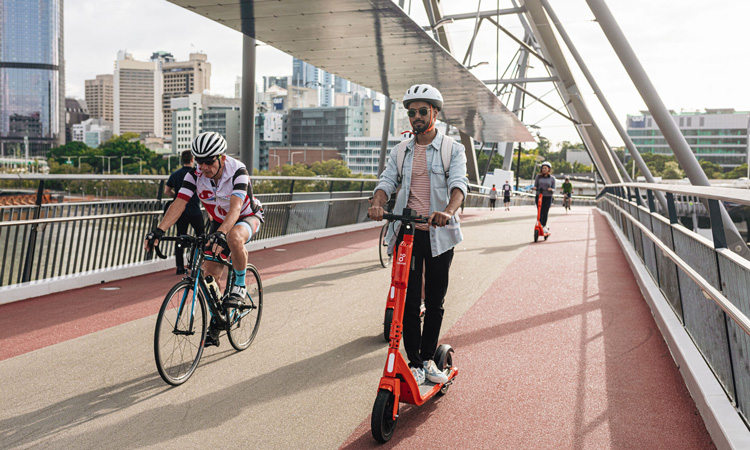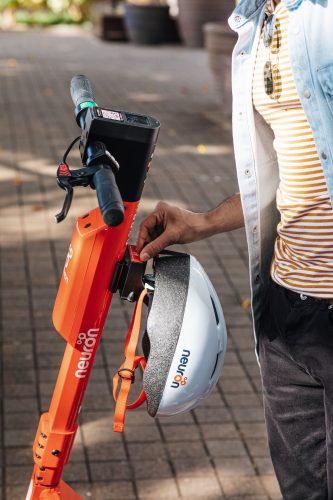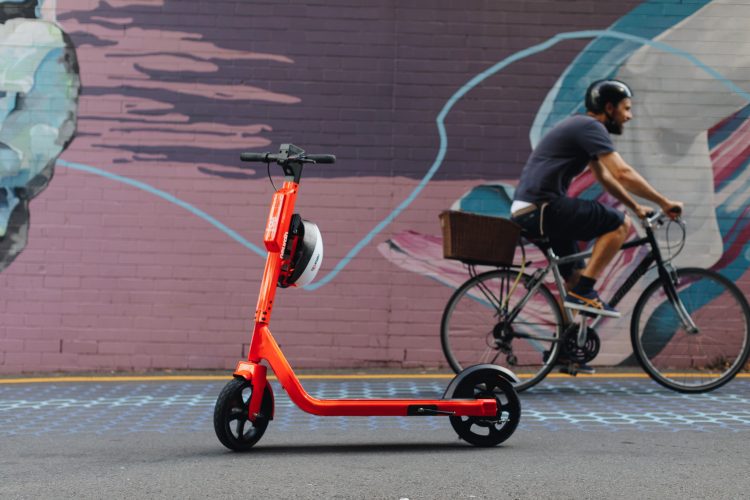E-scooters: adapting to the new normal
- Like
- Digg
- Del
- Tumblr
- VKontakte
- Buffer
- Love This
- Odnoklassniki
- Meneame
- Blogger
- Amazon
- Yahoo Mail
- Gmail
- AOL
- Newsvine
- HackerNews
- Evernote
- MySpace
- Mail.ru
- Viadeo
- Line
- Comments
- Yummly
- SMS
- Viber
- Telegram
- Subscribe
- Skype
- Facebook Messenger
- Kakao
- LiveJournal
- Yammer
- Edgar
- Fintel
- Mix
- Instapaper
- Copy Link
Posted: 13 July 2020 | Zachary Wang - Neuron Mobility | 1 comment
Zachary Wang, CEO of Neuron Mobility, tells Intelligent Transport how the Asia-Pacific shared e-scooter firm has prepared to operate as part of the UK trials, as well as how it has adapted to new COVID-19 measures.


Credit: Neuron Mobility
What is Neuron Mobility?
Neuron Mobility (Neuron) is the fastest growing e-scooter operator in Asia-Pacific and the leading operator in Australia and New Zealand. We’re now preparing to launch in the UK and are really excited to have Neuron e-scooters on the UK’s streets.
We were founded in Singapore in 2016 and have previously operated e-scooter sharing services in Singapore, Malaysia and Thailand. More recently we have refocused our business towards Australia and New Zealand. We now operate in eight locations including Brisbane, Darwin, Adelaide and Auckland, New Zealand.
With UK e-scooter trials confirmed to take place on roads and not pavements in the UK, we believe our focus on safety will be even more important
Our mission is to partner with cities to connect people and places in a safe, convenient, and fun way. We develop e-scooters and software that significantly improve rider safety, providing a high level of oversight and control for cities in terms of speed, parking, and no-go areas by using GPS and geofencing.
What makes Neuron’s scooters so safe?
Safety is at the heart of what we do, it dictates our product design and how we integrate into cities. We made the decision early on to design our own e-scooters, they are purpose-built for safety and sharing. It is a major differentiator for us, and it has allowed us to lead the industry when it comes to safety. We have introduced many world-first features for our riders, and we are constantly looking for ways to improve safety.


We also innovated a 999 Emergency Button that detects accidents and helps riders call emergency services.
We created the world’s first talking e-scooter. The Voice Guidance feature allows us to educate, guide and warn riders. It gives them initial tips when they first ride, is used to warn them if they approach a geolocation boundary, and it acts as an alarm if the e-scooter is moved while not on a trip. There are many applications for this feature including reminders to sanitise during COVID-19.
Our mission is to partner with cities to connect people and places in a safe, convenient, and fun way
In Australia we pioneered the use of geolocation e-scooters which puts councils in control. This technology defines the riding area and can enforce different speeds in different environments. For example, we could designate a slow-zone in an area of high pedestrian footfall or in an area where there have previously been accidents. This technology can also be used to enforce no-go zones or no-parking zones. For example, we sometimes introduce no-parking zones next to waterways or unsafe areas to cut down on vandalism. Geolocation can be time-linked so you can even impose curfews for particular areas.
We have Topple Detection to show in real-time if an e-scooter has been left on its side in an unsafe way as this could cause problems particularly for the visually impaired. Our operations teams, working around the clock in cities, then reposition the e-scooter in a safe way.
With UK e-scooter trials confirmed to take place on roads and not pavements in the UK, we believe our focus on safety will be even more important.
What is the basis of the model that Neuron is going to use to help the UK “transition” to using e-scooters? Can this Australian model be translated to fit with UK riders?
There are a number of similarities with the Australian market in terms of culture, language and regulatory framework which help position us well to use our experience to successfully enter the UK market.
We are geared towards working in regulated markets. Our model in Australia has been focused on working in partnership with city councils on a range of initiatives that help them deliver innovative, safe and sustainable transport. These include integrating new technology as a result of specific requests from cities like geofencing to control slow-zones, no-go zones and no-parking zones. Our ‘Living Lab Team’ provides anonymised data of e-scooter movements, speed and drop-off and pick-up points to help the City Council’s better manage their transport system. We also work on safety and education campaigns so that riders are more aware of how to use e-scooters as safely as possible.
The climate is certainly different between Brisbane and Birmingham, but when we made the decision to design and develop our own e-scooters we ensured they would be able to tackle monsoon weather as well as extreme temperatures of the northern and southern hemispheres.
What are you expecting from the UK trials, and how have you prepared for any potential challenges?
We have been following the situation in the UK for a while and we were already looking at opportunities for 2021. However, COVID-19 has made everyone rethink travel and obviously this has fast-tracked the UK government’s plans to run, and expand, e-scooter trials across the UK. We see real potential for our N3 e-scooter model which is focused on safety and sharing. Our business model is to work in partnership with local authorities, so we are excited.
The “new normal” is likely to see social distancing and extra sanitisation come to the fore which means that people are considering options beyond public transport. We are at the start of the micromobility journey, there is tremendous potential for growth and that’s very exciting. Clearly towns and cities in the UK are looking to solve problems like congestion, emissions, and to extend the range of existing transport networks and we want to work with them on this.
Governments are already realising that cars are not the answer, as there isn’t enough space in cities, and they aren’t efficient


E-scooters are one of the most efficient ways to move people short distances in cities. The small footprint of an e-scooter allows for much higher space efficiency than other modes of transport. An e-scooter is very lightweight and this means it has a much higher energy efficiency. It’s a simple form factor which means it’s relatively inexpensive to manufacture – these factors make e-scooters very affordable for people to use on a regular basis.
From our observations in Australia, consumers have embraced e-scooters as a new transport option, and with COVID-19, many are looking for more individual transport options that allow them to continue social distancing.
How has COVID-19 impacted your operations?
COVID-19 and its devastating impact has led to a transformation in the micromobility industry. When the pandemic broke, we had to adapt very quickly; looking back it’s amazing how fast motivated organisations can act when they are behind a common goal. Almost overnight we introduced sanitisations teams working around the clock armed with hospital-grade disinfectant to keep our e-scooters germ-free. We also introduced measures like increased sanitisation, the use of personal protective equipment, and revised travel and illness policies to safeguard our employees. This helped to protect our business and also our reputation.
The “new normal” is likely to see social distancing and extra sanitisation come to the fore which means that people are considering options beyond public transport
Most other e-scooter operators stopped operating immediately, however we decided to keep our service running to support the cities and our riders. We provided free passes to public health workers. One of our company priorities has always been to be a true partner to the cities we operate so it just seemed the right thing to do.
What does Neuron see mobility looking like in five years?
As we start to recover from COVID-19, the next six to 12 months will see cities looking at new ways of moving around to continue social distancing. So, we’ll see a shift from traditional mass transport to more individual options. Governments are already realising that cars are not the answer, as there isn’t enough space in cities, and they aren’t efficient.
We’ve already seen a rise in cycling, e-bikes and e-scooters during the lockdown, so we’ll definitely see this trend continue. Cities will be allocating more budget to create the right infrastructure to incentivise this trend. Many of the changes happening in the urban transportation scene will become permanent changes.
We also work on safety and education campaigns so that riders are more aware of how to use e-scooters as safely as possible
Looking at mobility in the next five years, we’ll see better electrification of cars, particularly as we move towards greener, more sustainable lifestyles. Secondly, there will be a focus on connectivity – cars are one of the few parts of our lives that are not yet connected. With better connectivity, the transport network can be better optimised for efficiency, with real-time communication. Lastly, there will be more people shifting from ownership-based mobility to service-based mobility. We have already been seeing this over the past decade with ridesharing apps and shared micromobility programmes, and moving forward there will be even fewer people who own a car. It’s a very exciting time and Neuron is well positioned to help towns and cities respond to these changes.
Biography
Zach is a serial entrepreneur who is committed to using sustainable technology to improve urban living. As the Co-founder and Chief Executive Officer of Neuron Mobility, he aims to transform urban areas by bringing sustainable personal mobility to cities around the world.
Zach leads the company with a passion and enthusiasm for building smart cities. His role involves collaborating with councils to solve problems such as congestion, emissions, and to safely extend the range of existing transport networks.
He is also the founder of Rezeca Renewables – the largest residential solar provider in Singapore, with a strong presence in Thailand for commercial and industrial applications. Zach spent years building hydrogen fuel cell electric cars while at university, and he won several championships at the Shell Eco-Marathon in Europe and Asia. Zach holds a Bachelor’s Degree in Mechanical Engineering and Automotive Systems from the National University of Singapore.
Related topics
COVID-19, Mobility Services, Sustainable Urban Transport, Vehicle & Passenger Safety
Related modes
e-scooters
Related cities
Asia-Pacific, UK
Related organisations
Neuron Mobility









E Scooters are an absolute nightmare and a danger to all on our roads and pavements. Riders weave in and out of traffic and pedestrians with no thought for the safety of others and themselves.They should be banned from all public places before someone is killed